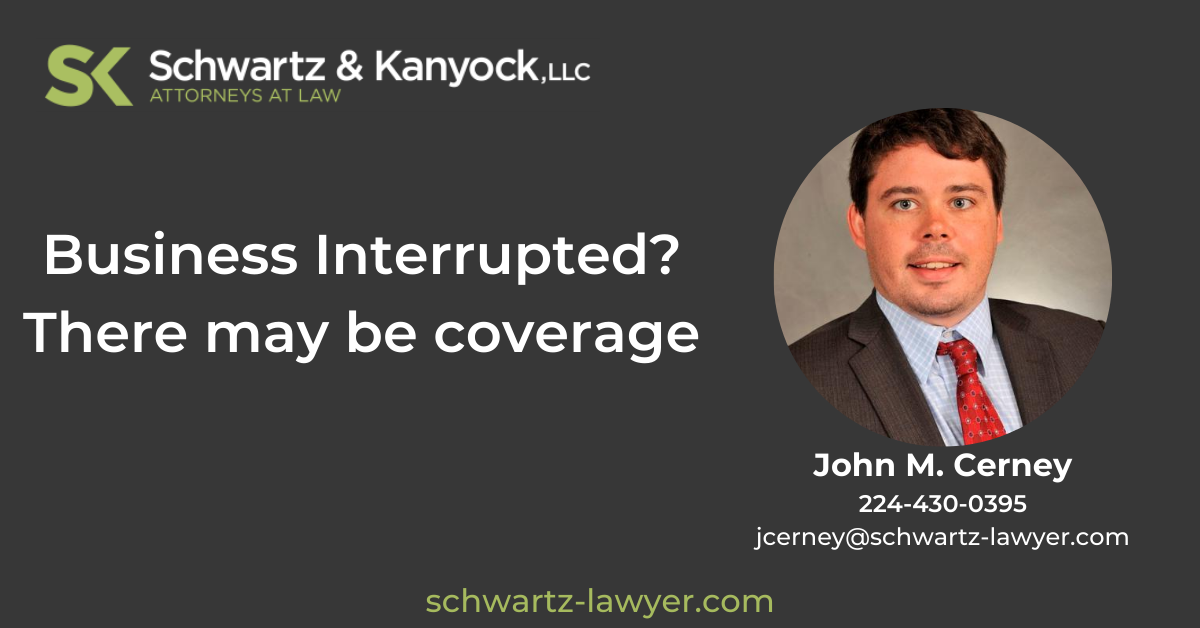
Business Interrupted? There May be Coverage
By John Cerney
On March 15, 2020, Governor J.B. Pritzker declared a public health emergency throughout Illinois closing all “non-essential businesses” to address the COVID-19 pandemic. Many businesses insure against losses incurred due to unforeseen events like the pandemic through “business interruption coverage.” Many businesses have submitted claims for coronavirus-related business interruption. Predictably, many insurers have denied coverage.
What’s Covered under Business Interruption Provisions?
Business interruption coverage provisions often appear within all-risk property insurance policies. All-risk policies essentially cover everything not specifically excluded under the policy; these provisions cover a broad range of losses caused by the suspension of business. The insured must show (a) a loss (b) resulting from a fortuitous event, and (c) an all-risk policy covering the property was in effect at the time of the loss. The insurer bears the burden to prove specific exclusions from coverage under the policy.
Insurance companies sometimes claim that only tangible structural losses meet the direct physical loss or damage requirements (e.g. a tornado destroying an office building thereby interrupting business). Illinois Courts have rejected that argument, holding that the actual or potential presence of a dangerous substance, even without structural damage, constitutes physical loss or damage triggering coverage under all-risk policies.
Is SARS-CoV-2 Exposure Excluded?
The answer depends on the policy language. Many policies do not specifically define “physical loss” or “physical damage,” leaving the question ambiguous. Fortunately for insureds, Illinois courts construe coverage clauses broadly in favor of the insured to afford the greatest possible coverage. Some policies contain virus/bacteria exclusions which say something like the following: “The insurer will not pay for damage caused by or resulting from any virus, bacterium or other microorganism that induces or can induce physical distress, illness, or disease.”
Virus Exclusions – Not the End of the Story
Illinois law reads provisions that exclude or limit coverage narrowly, and applies them only where such terms are clear, definite, and specific. Illinois courts construe these clauses in favor of the insured and most strongly against the insurer. Virus exclusions exclude damage “caused by or resulting from” viruses; they do not mention business closures mandated by executive orders or disaster declarations responding to the imminent threat of the spread of disease. Therefore, the question focuses on whether the virus or the government action caused the interruption. A narrow reading of this language may suggest that the non-excluded government action did so.
Courts distinguish between a disaster that interrupts business operations and governmental action that limits access to property, and policies often provide coverage when a business suffers losses due to orders of civil authorities. Where a singular injury results from two or more causes, only one of which is covered, the predominate cause determines whether the loss is covered. Therefore, business losses suffered from this pandemic should not trigger a virus exclusion where the losses predominantly resulted from a civil order. Many businesses remained open for weeks and months after the emergence of the virus and have reopened while the threat of the virus remains; therefore, the civil action seems to be the predominant cause of losses suffered due to closures.
What to do about it?
Policy owners who have faced and continue to face business interruptions due to closures relating to the Coronavirus pandemic should carefully read their policy language to assess the availability of coverage. Our experts at Schwartz Law Group, LLC have years of experience litigating insurance coverage matters in state and federal court. If your business has been interrupted and your insurance carrier has denied coverage, schedule a consultation today with one of our attorneys.
